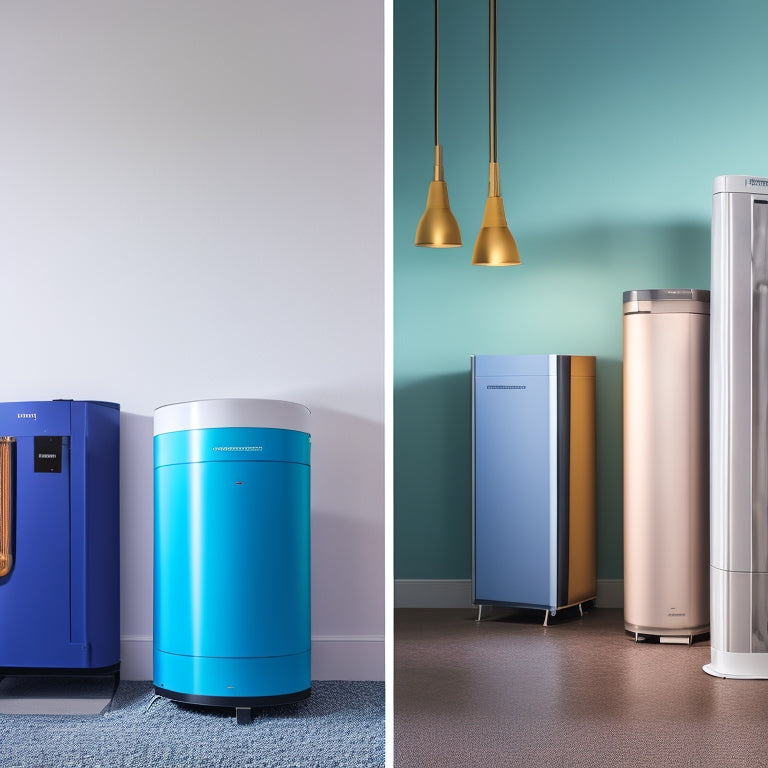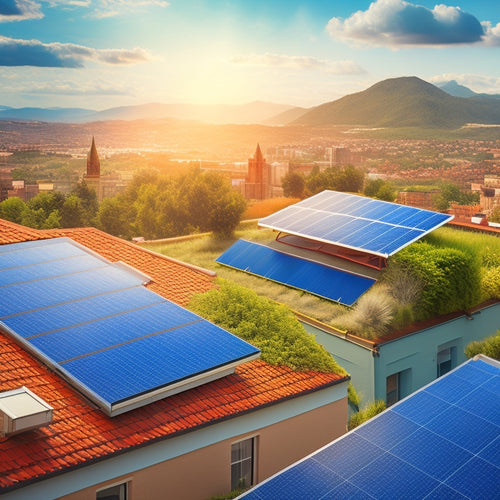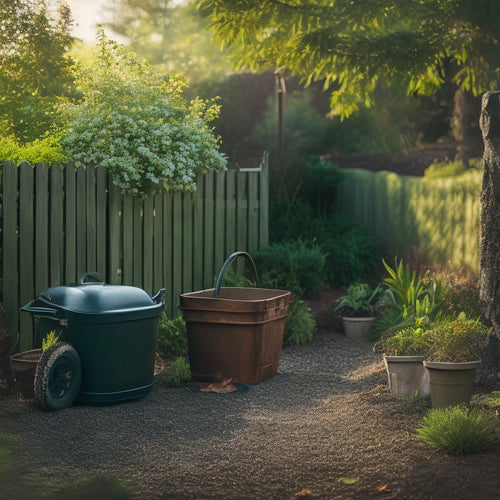
10 Best Energy-Efficient Heat Pump Water Heaters Compared
Share
You're about to switch to a heat pump water heater that can slash your energy consumption by up to 80%, saving you hundreds of dollars each year. Models like the A. O. Smith Voltex Hybrid Electric Water Heater and Stiebel Eltron Accelera 300 Hybrid lead the way in energy efficiency, with exceptional EF ratings and reduced energy bills. By understanding key performance metrics such as First Hour Rating and Uniform Energy Factor ratings, you'll be able to select the best model for your needs. Now, explore the top-ranked models and uncover the perfect combination of energy efficiency, cost savings, and eco-friendliness that suits your lifestyle.
Key Takeaways
- Top energy-efficient heat pump water heaters feature high EF ratings, such as the A. O. Smith Voltex Hybrid Electric Water Heater with a 3.45 EF rating.
- Models like the Stiebel Eltron Accelera 300 Hybrid reduce energy consumption by up to 80%, minimizing environmental footprint and energy bills.
- Heat pump technology captures thermal energy from the air, enhancing water heater efficiency, and can be powered by renewable energy sources.
- Look for models with high Uniform Energy Factor (UEF) ratings, which measure overall efficiency, and First Hour Rating (FHR), which impacts energy consumption and performance.
- Consider factors like installation costs, maintenance needs, and warranty durability when comparing and selecting the best energy-efficient heat pump water heater for your needs.
Top Energy-Efficient Models Ranked
Your search for the most energy-efficient heat pump water heater models ends here.
You're about to uncover the top-ranked models that utilize state-of-the-art energy-saving technologies and heat pump innovations.
With the increasing adoption of electric vehicles, it's crucial to reflect on the benefits of solar-powered charging solutions solar-powered EV charging and fast charging infrastructure to minimize our carbon footprint.
The A. O. Smith Voltex Hybrid Electric Water Heater leads the pack, boasting an impressive 3.45 EF rating.
The Stiebel Eltron Accelera 300 Hybrid Water Heater follows closely, featuring advanced heat pump innovations that reduce energy consumption by up to 80%.
The GE GeoSpring Hybrid Water Heater rounds out the top three, offering an exceptional 2.35 EF rating.
These models are designed to give you the freedom to enjoy hot water while minimizing your environmental footprint and energy bills.
With these energy-efficient heat pump water heaters, you can have it all.
Heat Pump Water Heater Basics
Heat pump water heaters operate on a fundamentally different principle than traditional electric or gas-powered water heaters. They employ heat pump technology to capture thermal energy from the air, which is then transferred to heat water. This approach greatly enhances water heater efficiency, allowing you to enjoy hot water while reducing your energy consumption.
By leveraging renewable energy sources, heat pump water heaters can further minimize their carbon footprint. Additionally, they can be powered by sustainable charging solutions, making them an attractive option for eco-conscious consumers.
The heat pump's refrigerant fluid is circulated through a coil, absorbing heat from the air and releasing it to the water. This process enables heat pump water heaters to achieve higher efficiency ratings compared to traditional water heaters, often exceeding 200% efficiency.
Energy Consumption Comparison
The efficiency of heat pump water heaters becomes even more apparent when comparing their energy consumption to traditional water heaters.
You'll notice that heat pump water heaters operate at a markedly lower energy usage trend, typically around 2-3 kilowatt-hours (kWh) per day. In contrast, traditional water heaters can consume up to 4.5 kWh per day.
This difference in energy consumption translates to considerable cost savings over time. For instance, grid capacity upgrades can also play an essential role in supporting increased power demand and preventing outages.
Similarly, investments in grid technology can enhance overall efficiency and reliability, which is vital for heat pump water heaters.
On average, heat pump water heaters can save you around $300 to $400 per year on your energy bills. By choosing a heat pump water heater, you're not only reducing your energy usage but also enjoying notable financial benefits.
First Hour Rating Explained
You're likely familiar with the First Hour Rating (FHR) of your heat pump water heater, but do you know how it's calculated or how it impacts the energy efficiency of your system?
The FHR calculation method takes into account the heater's ability to meet peak hot water demand during a one-hour period. Understanding this rating is essential, as it directly affects your water heater's energy consumption and overall performance.
Much like how solar-powered charging stations can lead to annual savings of up to $2,000+, optimizing your heat pump water heater's FHR can also result in significant energy and cost savings.
FHR Calculation Method
Calculating the first hour rating (FHR) of a heat pump water heater requires a thorough understanding of its operational characteristics. You need to know how the unit performs under different conditions to accurately determine its FHR significance.
The FHR calculation involves evaluating the heater's ability to supply hot water during peak demand periods. To maximize energy efficiency, it's crucial to take into account federal and state tax incentives and utility discounts that can help reduce energy costs.
-
The calculation takes into account the heater's maximum hot water supply capacity, typically measured in gallons per hour.
-
It also takes into account the temperature of the incoming cold water and the desired hot water temperature.
-
Additionally, the calculation factors in the heater's efficiency and recovery rate, which affect its ability to replenish hot water supply.
Energy Efficiency Impact
Plunge into the world of heat pump water heaters and you'll quickly realize that energy efficiency is paramount.
When you opt for an energy-efficient heat pump water heater, you'll reap significant energy savings. In fact, these systems can be up to 3 times more efficient than traditional electric water heaters. This translates to lower energy bills and a reduced carbon footprint.
By choosing an energy-efficient heat pump water heater, you'll not only save money but also contribute to environmental benefits. With the ability to reduce greenhouse gas emissions, you'll be doing your part in preserving the planet's natural resources.
Uniform Energy Factor Ratings
When you're shopping for a heat pump water heater, you'll likely come across the Uniform Energy Factor (UEF) rating, a standardized metric that measures the product's overall efficiency.
This rating takes into account both the heat pump's efficiency and the standby losses, providing a more thorough view of its energy performance.
UEF Rating Explained
Most heat pump water heaters boast a UEF rating, a metric that helps you gauge their energy efficiency. The UEF (Uniform Energy Factor) rating is a standardized measure of a heat pump water heater's efficiency, considering its ability to convert electrical energy into usable heat.
-
UEF standards are set by the US Department of Energy, ensuring a consistent comparison across different models and brands.
-
A higher UEF rating indicates a more energy-efficient unit, which can lead to significant savings on your utility bills.
-
UEF advantages include providing an extensive overview of a heat pump water heater's performance, helping you make an informed decision when selecting the best model for your needs.
Benefits of High UEF
Each percentage point increase in your heat pump water heater's UEF rating can translate to significant energy savings over time.
You'll reap the benefits of a high UEF rating through lower utility bills and a reduced carbon footprint. In the long term, these energy savings can add up, giving you more financial freedom to allocate resources as you see fit.
A higher UEF rating also means your heat pump water heater will operate more efficiently, providing you with a steady supply of hot water while minimizing its impact on the environment.
Factors Affecting UEF Score
During the evaluation process, you'll uncover that several factors influence a heat pump water heater's UEF score.
These factors have a direct impact on the overall performance metrics of the unit, ultimately affecting its efficiency standards.
-
The type and quality of the compressor used, as it affects the unit's ability to efficiently transfer heat energy.
-
The design and insulation of the storage tank, which impacts heat loss and retention.
-
The control system's ability to optimize performance based on various operating conditions, such as temperature and flow rates.
Environmental Impact Analysis
Your carbon footprint shrinks with every hot shower when you opt for an energy-efficient heat pump water heater.
By adopting these sustainability practices, you're contributing to a greener future. Heat pump water heaters reduce greenhouse gas emissions, which are a significant contributor to climate change.
They work by capturing heat from the air, rather than generating it from fossil fuels. This results in a significant decrease in carbon emissions, making them an attractive option for environmentally conscious consumers.
Installation and Maintenance Costs
When you consider installing a heat pump water heater, you'll need to factor in the initial investment costs, which can be higher than those of traditional water heaters.
However, these costs can be offset by the long-term energy savings and potential rebates or incentives.
You'll also need to plan for ongoing maintenance needs, such as filter cleaning and replacement, to guarantee peak performance and efficiency.
Initial Investment Costs
Implementing an energy-efficient heat pump water heater requires a significant upfront investment, which includes installation and maintenance costs that can add up quickly. As you consider investing in this technology, it's crucial to understand the initial investment costs involved.
-
You may need to pay for professional installation, which can range from $1,000 to $3,000, depending on the complexity of the job and the location.
-
Additionally, you may need to upgrade your electrical system or plumbing to accommodate the new heater, adding to the overall cost.
-
Fortunately, many manufacturers and government agencies offer financing options to help offset the initial investment, making it more accessible to those seeking long term savings and energy independence.
Ongoing Maintenance Needs
Heat pump water heaters require regular maintenance to guarantee peak performance and extend their lifespan.
You'll need to perform routine checks on the system, ensuring proper air flow and inspecting for signs of corrosion or damage.
Filter replacement is also essential, as a clogged filter can reduce efficiency and increase energy bills.
Regular cleaning of the condenser coils and checking the refrigerant charge will also help maintain ideal performance.
Noise Level and Operation
Your heat pump water heater's operating noise level is an essential consideration, especially if you plan to install it in a residential area or a space where noise can be a disturbance.
You'll want to guarantee the unit you choose is designed with noise reduction in mind. Look for models with features that promote quiet operation, such as:
- Insulation and sound-dampening materials to minimize vibrations and noise
- Advanced fan designs that reduce motor noise
- Smart sensors that optimize compressor operation for reduced noise output
Warranty and Durability Factors
The lifespan of your heat pump water heater is a critical aspect to evaluate, as it directly impacts your return on investment and overall satisfaction with the unit.
You'll want to scrutinize the warranty coverage offered by each manufacturer. Look for extensive coverage that spans at least 6-10 years, with some extending up to 20 years.
Durability testing is also essential to assess the unit's resilience against corrosion, rust, and other environmental factors. Check if the manufacturer has subjected their product to rigorous testing, such as UL (Underwriters Laboratories) or IAPMO (International Association of Plumbing and Mechanical Officials) certification.
Best Value for Your Money
One key consideration when investing in a heat pump water heater is getting the best value for your money. You want a unit that will provide long-term savings without breaking the bank upfront.
When making a cost comparison, consider the following factors:
-
Initial cost: The purchase price of the heat pump water heater, including installation fees.
-
Operating cost: The cost of electricity to run the unit, as well as any maintenance or replacement parts.
-
Long-term savings: The amount of money you'll save on your energy bills over time due to the unit's energy efficiency.
Frequently Asked Questions
Can I Install a Heat Pump Water Heater in an Unheated Garage?
You can install a heat pump water heater in an unheated garage, but guarantee proper garage insulation to maintain a consistent temperature, and strategically place the heat pump to optimize performance and minimize energy losses.
Do Heat Pump Water Heaters Require More Maintenance Than Traditional Heaters?
You'll find that heat pump water heaters require less maintenance than traditional heaters, with fewer moving parts and no combustion risks, resulting in lower maintenance frequency and cost, giving you more freedom to focus on what matters.
Can I Use a Heat Pump Water Heater With a Solar Thermal System?
You'll be surprised to know that 70% of water heating energy can be offset with solar thermal systems! When you integrate a heat pump water heater with solar, you'll maximize solar integration and energy savings, giving you more freedom over your energy consumption.
Are Heat Pump Water Heaters Compatible With Radiant Floor Heating Systems?
You're wondering if heat pump water heaters are compatible with radiant floor heating systems; the answer lies in radiant efficiency, where system compatibility is key, ensuring seamless integration and optimized performance, granting you the freedom to choose the best setup for your needs.
Can I Install a Heat Pump Water Heater in a Cold Climate?
You think you're a rebel, installing a heat pump water heater in a cold climate? Well, buckle up, friend! Heat pump performance takes a hit in freezing temps, so you'll need to contemplate specialized designs, insulation, and antifreeze measures to keep it running smoothly.
Related Posts
-

5 Efficient Air Circulation Methods for Green Homes
You can utilize the power of natural ventilation techniques, whole house fans, and solar-powered ventilation systems ...
-

What Roofing Materials Best Protect Our Planet?
As you consider the environmental impact of your building, you're likely to find that the roofing material you choose...
-

10 Green Waste Solutions Every Homeowner Should Know
You can make a significant impact on the environment by implementing green waste solutions at home. Consider composti...


